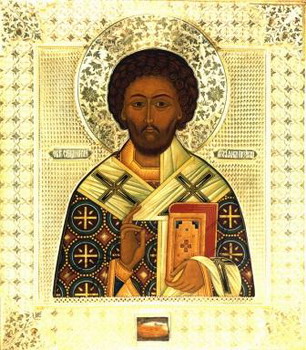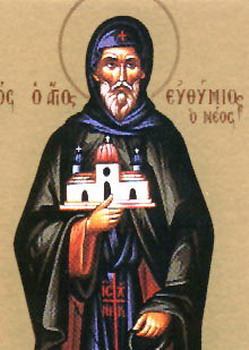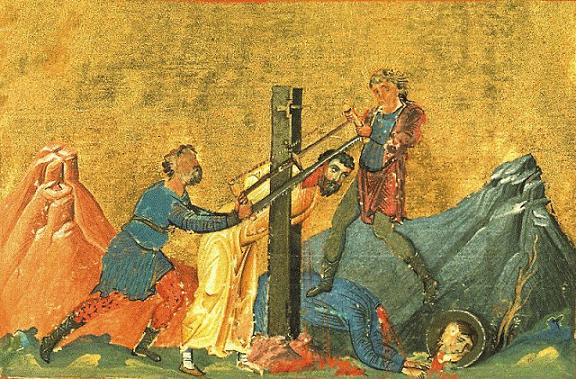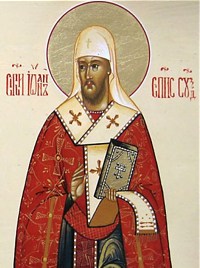|
|
Our Holy Father, the Martyr Lucian, Presbyter of Antioch Born of noble parents in Syrian Samosata, he received in his youth a very wide education, both secular and spiritual, and was a man eminent both for his learning and for his strict ascetic life. Giving his goods away to the poor, he supported himself by the writing of works of instruction, feeding himself thus by the work of his hands. He did a very great service to the Church in the work which he undertook of the correcting of the Hebrew text of the Scriptures in many places, texts which heretics had taken the opportunity to twist and corrupt according to their wicked teaching. Because of his learning and his great spirituality, he was ordained priest in Antioch. In the time of Maximian"s persecution, when St Anthimus of Nicomedia and St Peter of Alexandria were put to torture, St Lucian was also on the list of those whom the Emperor wanted to have killed. Lucian fled the city and hid, but a jealous heretic priest, Pancratius, revealed his whereabouts. The persecution was terrible at that time, and not even tiny children were safe. Two boys, who would not eat food offered to idols, were thrown into a bath of boiling water, where, under torture, they gave their holy souls into God"s hands. A disciple of Lucian"s, Pelagia (see Oct. 8th), to preserve her virginal purity from the dissolute authorities, gave her soul into God"s hands, and her body fell from the roof of her house. Lucian was taken to Nicomedia. to appear before the Emperor. On the way, he managed to bring forty soldiers to Christ by his counsel, and thev all died a martyr"s death. After interrogation and flogging, St Lucian was thrown into prison, where he was tortured by hunger. "He scorned hunger", writes St John Chrysostom of Lucian. "Let us also scorn luxury and destroy the lordship of the stomach; that we may, when the time comes for us to meet such torture, be prepared beforehand, by the help of a lesser ascesis, to show ourselves worthy of glory in the hour of battle." He received Communion in prison on the Theophany, and on the following day gave his soul into God"s hands, on January 7th, 312. Born of noble parents in Syrian Samosata, he received in his youth a very wide education, both secular and spiritual, and was a man eminent both for his learning and for his strict ascetic life. Giving his goods away to the poor, he supported himself by the writing of works of instruction, feeding himself thus by the work of his hands. He did a very great service to the Church in the work which he undertook of the correcting of the Hebrew text of the Scriptures in many places, texts which heretics had taken the opportunity to twist and corrupt according to their wicked teaching. Because of his learning and his great spirituality, he was ordained priest in Antioch. In the time of Maximian"s persecution, when St Anthimus of Nicomedia and St Peter of Alexandria were put to torture, St Lucian was also on the list of those whom the Emperor wanted to have killed. Lucian fled the city and hid, but a jealous heretic priest, Pancratius, revealed his whereabouts. The persecution was terrible at that time, and not even tiny children were safe. Two boys, who would not eat food offered to idols, were thrown into a bath of boiling water, where, under torture, they gave their holy souls into God"s hands. A disciple of Lucian"s, Pelagia (see Oct. 8th), to preserve her virginal purity from the dissolute authorities, gave her soul into God"s hands, and her body fell from the roof of her house. Lucian was taken to Nicomedia. to appear before the Emperor. On the way, he managed to bring forty soldiers to Christ by his counsel, and thev all died a martyr"s death. After interrogation and flogging, St Lucian was thrown into prison, where he was tortured by hunger. "He scorned hunger", writes St John Chrysostom of Lucian. "Let us also scorn luxury and destroy the lordship of the stomach; that we may, when the time comes for us to meet such torture, be prepared beforehand, by the help of a lesser ascesis, to show ourselves worthy of glory in the hour of battle." He received Communion in prison on the Theophany, and on the following day gave his soul into God"s hands, on January 7th, 312.Our Holy Father Euthymius the New Born in Ancyra in 824, of righteous parents Epiphanius and Anna, he served in the army, married and had one daughter, Anastasia. He lived for a long time in asceticism in the monasteries of Olympus and then on the Holy Mountain, and also lived for some time as a stylite near Salonica, where he founded monasteries for men and women. He entered into rest on an island near the Holy Mountain at the end of the ninth century. His holy and wonderworking relics are preserved in Salonica. Born in Ancyra in 824, of righteous parents Epiphanius and Anna, he served in the army, married and had one daughter, Anastasia. He lived for a long time in asceticism in the monasteries of Olympus and then on the Holy Mountain, and also lived for some time as a stylite near Salonica, where he founded monasteries for men and women. He entered into rest on an island near the Holy Mountain at the end of the ninth century. His holy and wonderworking relics are preserved in Salonica.Martyrs Sarbelus and Bebai (Barbea) of Edessa (2nd c.) The Holy Martyrs Sarbilos and Bebea – were brother and sister by birth, suffering in the II Century under the emperor Trajan for confessing Christianity. The Martyr Sarbilos was an idolous priest at Edessa, but having been converted to Christ by a certain bishop, he accepted Baptism with his sister. Pagans tortured the saints for a long while, and then beheaded them. The Holy Martyrs Sarbilos and Bebea – were brother and sister by birth, suffering in the II Century under the emperor Trajan for confessing Christianity. The Martyr Sarbilos was an idolous priest at Edessa, but having been converted to Christ by a certain bishop, he accepted Baptism with his sister. Pagans tortured the saints for a long while, and then beheaded them.St. Sabinus, bishop of Catania (760) Sainted Sabinus, Bishop of the city of Catania in Sicily, fervently wanting to serve the Lord, withdrew into the wilderness. Here he led a strict ascetic life and received from the Lord gifts of wonderworking and perspicacity. Sainted Sabinus, Bishop of the city of Catania in Sicily, fervently wanting to serve the Lord, withdrew into the wilderness. Here he led a strict ascetic life and received from the Lord gifts of wonderworking and perspicacity.St. Barses the Confessor, bishop of Edessa (378)
St. John, bishop of Suzdal (1385) Sainted John, Bishop of Suzdal', entered one of the monasteries of Suzdal' in his youthful years. For his virtuous and humble life, the saint was made the first bishop of Suzdal' and Nizhegorod in 1350. Bishop John merited a great mercy of God: during the time of Divine Liturgy the Suzdal' prince Boris Konstantinovich saw, how an Angel of God attended the saint. Saint John was known for his love towards the destitute and the sick; for the poor he interceded before the princes about an amelioration of taxes, and for the sick he built poor-houses and hospices... Sainted John, Bishop of Suzdal', entered one of the monasteries of Suzdal' in his youthful years. For his virtuous and humble life, the saint was made the first bishop of Suzdal' and Nizhegorod in 1350. Bishop John merited a great mercy of God: during the time of Divine Liturgy the Suzdal' prince Boris Konstantinovich saw, how an Angel of God attended the saint. Saint John was known for his love towards the destitute and the sick; for the poor he interceded before the princes about an amelioration of taxes, and for the sick he built poor-houses and hospices... |